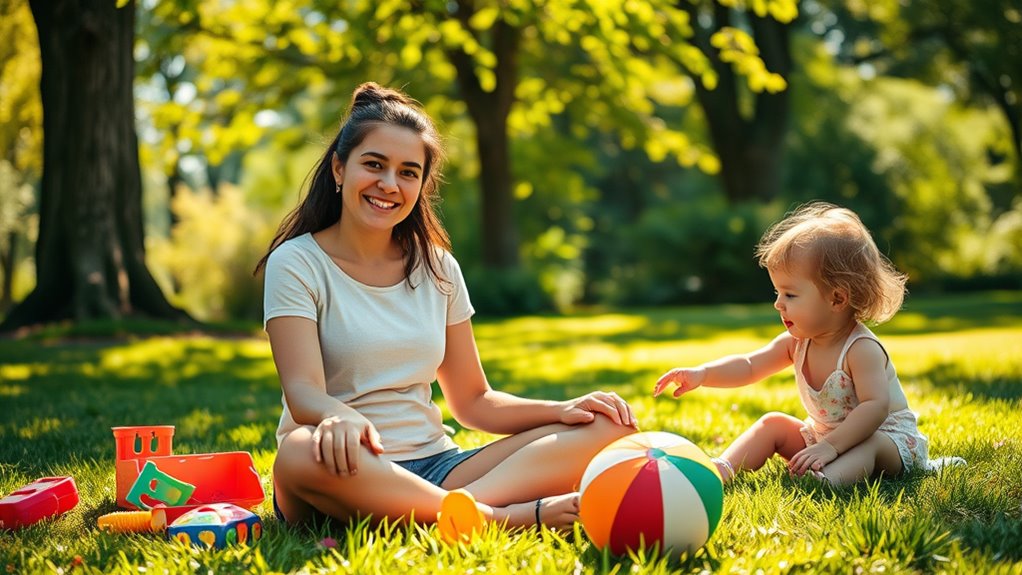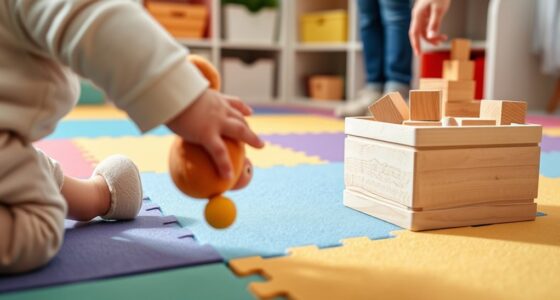To fuel your playful energy, prioritize self-care by setting clear boundaries and protecting your downtime. Say no when needed and carve out specific moments for yourself—whether through mindfulness, deep breaths, or short breaks. This helps you manage stress, stay emotionally resilient, and retain your patience. As you maintain consistent self-care practices, you’ll find it easier to stay present and joyful amid parenting chaos—keep exploring how to make this your reality.
Key Takeaways
- Set clear boundaries on your availability to conserve energy and prevent burnout.
- Practice mindfulness and deep breathing to build emotional resilience and stay present.
- Prioritize small, intentional self-care activities that recharge your mental and emotional well-being.
- Recognize and accept your feelings to manage reactions and maintain patience with your children.
- Consistently reflect and adjust boundaries to sustain a joyful, playful parenting experience.

Why is it so easy for parents to forget to take care of themselves? Between managing schedules, attending to the endless needs of your children, and juggling household responsibilities, your own well-being often slips to the bottom of the list. But neglecting yourself isn’t just about feeling tired; it impacts your ability to stay engaged, playful, and emotionally resilient. One way to counter this is by establishing mindful boundaries that protect your energy and mental health. Setting clear limits on your availability lets you carve out time for self-care without guilt. For example, designating specific periods where you’re not reachable or saying no to extra commitments helps you conserve emotional and physical resources. These mindful boundaries aren’t about shutting people out—they’re about prioritizing your well-being so you can show up fully for your kids and yourself. Incorporating self-reflection into your routine can help you identify what boundaries are most needed and how to implement them effectively.
Building emotional resilience is equally essential. It’s the buffer that helps you bounce back from daily frustrations, tantrums, or setbacks—both your own and your children’s. When you nurture your emotional resilience, you become better equipped to handle stress with patience and calmness. This, in turn, creates a more playful environment where your energy is less drained by tension or overwhelm. Techniques like mindfulness meditation, deep breathing exercises, or simply taking a few moments to pause and reflect can strengthen this resilience. Recognizing and accepting your feelings without judgment also plays a crucial role. It’s okay to feel exhausted or frustrated—that’s part of parenting. What matters is how you respond to those feelings. Developing this awareness allows you to manage emotions more effectively, so you can remain playful and present.
Prioritizing your self-care by setting mindful boundaries and cultivating emotional resilience isn’t selfish; it’s essential. When you protect your mental and emotional space, you create a foundation that sustains your playful energy. You’ll notice that your patience lengthens, your mood lifts, and your capacity for joy grows. It’s a continuous process—small, intentional steps make a big difference. Remember, taking care of yourself isn’t a luxury; it’s a necessity that enables you to enjoy the chaos and beauty of parenting with more energy and less stress. As you become more mindful of these boundaries and resilient in your emotional responses, you’ll find it easier to stay connected to your playful spirit, making everyday moments more joyful for both you and your children.
Frequently Asked Questions
How Can Parents Find Time for Self-Care Daily?
You can find daily self-care time by incorporating simple activities like mindful breathing and gratitude journaling into your routine. Take a few moments each day to breathe deeply, helping you stay centered. Keep a gratitude journal nearby and jot down what you’re thankful for, boosting your mood and energy. Even five minutes dedicated to these practices can recharge you, allowing you to approach parenting with more joy and playful energy.
What Are Quick Self-Care Activities for Busy Parents?
You’re busier than a squirrel on caffeine, so quick self-care is key! Try mindful breathing for just a minute to reset your mind, or squeeze in quick yoga stretches to release tension. These activities boost your energy instantly and take less time than brewing a cup of coffee. Incorporate them into your day, even for a few moments, and watch your playful energy soar—no fancy equipment needed!
How Does Self-Care Improve Parent-Child Relationships?
Self-care boosts your emotional resilience, helping you stay calm and patient with your child. When you prioritize your well-being, you’re more likely to practice mindful communication, which fosters trust and understanding. As a result, your parent-child relationship becomes stronger and more positive. By taking care of yourself, you set a healthy example, encouraging your child to develop emotional awareness and resilience too.
Can Self-Care Routines Be Adapted for Different Age Children?
Think of self-care routines as a garden—you customize the plants depending on the season. For different age children, you can adapt activities to be age-appropriate, like simple breathing exercises for toddlers or mindful journaling for older kids. By customizing routines, you meet their evolving needs, ensuring they feel supported and energized. This approach helps you stay balanced, making your self-care more effective and your connection with your children even stronger.
What Are Common Barriers to Parent Self-Care and Solutions?
You might face barriers like guilt management, making you feel selfish for taking time for yourself. Support networks can help you overcome this by offering encouragement and practical help. To break through these barriers, remind yourself that self-care fuels your energy and patience, benefiting your children too. Prioritize small, consistent routines, and don’t hesitate to seek support—it’s essential for maintaining your well-being and staying playful and engaged with your kids.
Conclusion
By prioritizing your self-care, you’ll open a wellspring of playful energy that transforms every moment with your kids. Remember, taking time for yourself isn’t just a small act—it’s like fueling a supernova of joy and patience that can light up even the stormiest days. So, don’t underestimate the power of small self-care acts; they’re the secret weapon in creating a happier, more vibrant family life. Keep nurturing yourself, and watch your playful energy explode beyond your wildest dreams!










